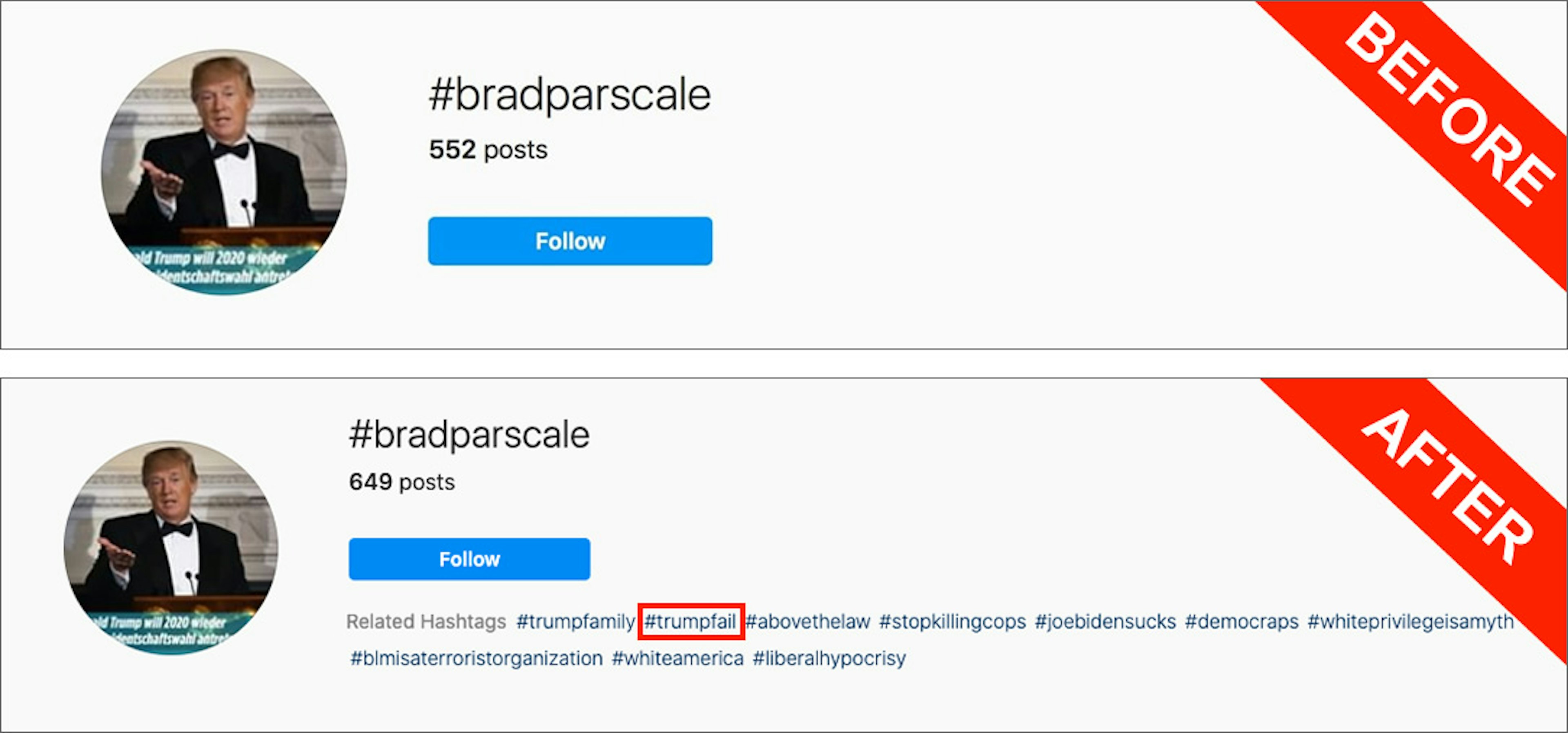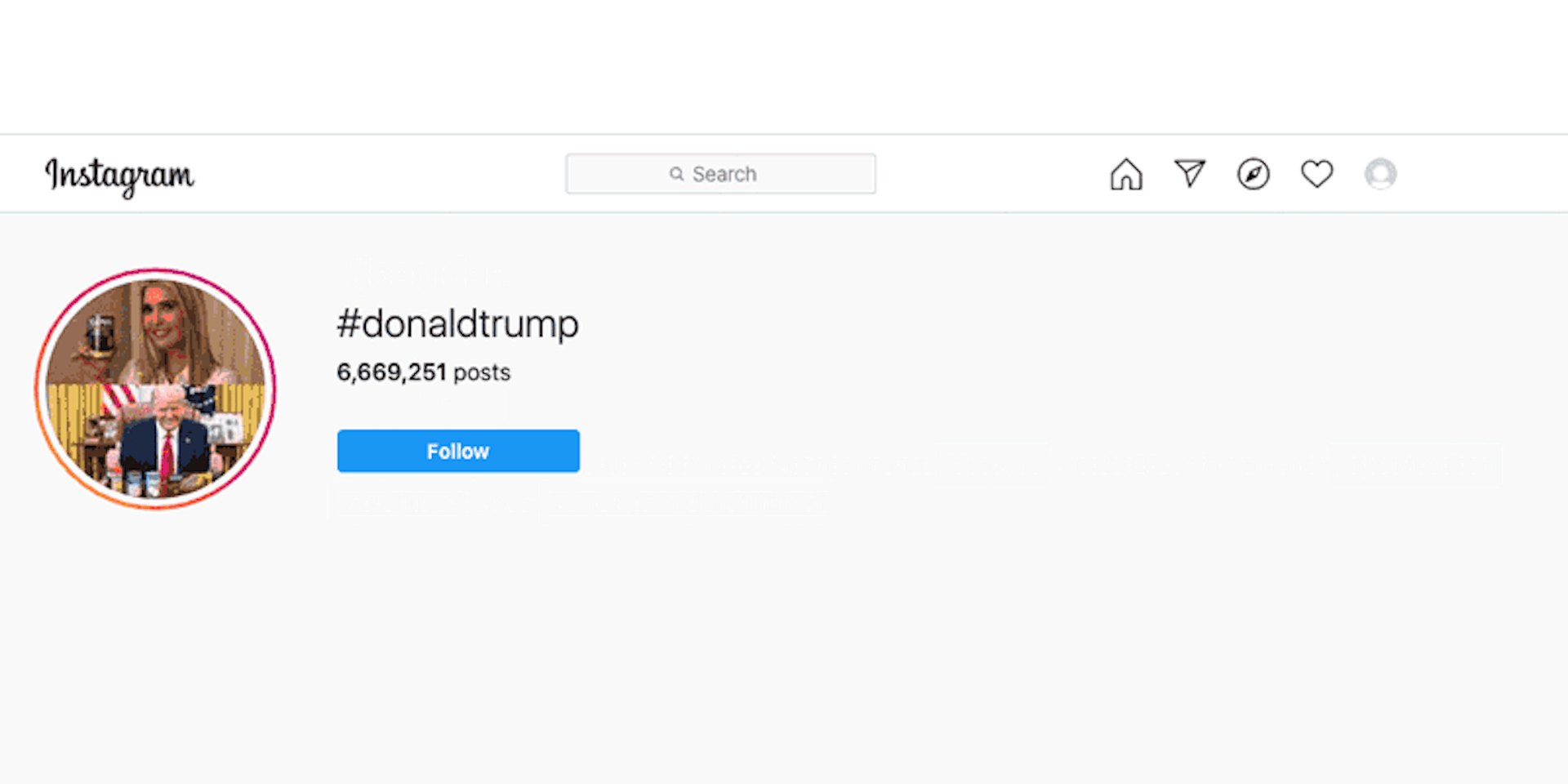Instagram has shielded President Donald Trump from potentially negative hashtags while allowing parallel content about Joe Biden to be hijacked by disinformation and smears, according to a Tech Transparency Project (TTP) investigation that reveals the platform’s uneven treatment of the two candidates heading into the 2020 election.
When a person searches Instagram for a hashtag and clicks on it, the platform has automatically generated “related hashtags” pointing users to other relevant content. TTP examined related hashtags for 20 popular terms associated with the Trump and Biden campaigns and found starkly different treatment of the two candidates.
Instagram blocked the display of related hashtags on all 10 of the Trump hashtags reviewed, including #donaldtrump, #trump and #trump2020. That means users were not directed to other content, including anything negative or critical about the president.
But for all 10 similar Biden hashtags, Instagram did display related hashtags, which at times steered users to insults and disinformation about the former vice president, with phrases like #creepyjoebiden, #joebidenpedophile and #joebidenisaracist.
Instagram appeared to turn off all related hashtags after a reporter from BuzzFeed, with whom TTP shared its findings, asked the company on Tuesday for comment on why it blocked related hashtags for key Trump content and not for parallel Biden content.
In one example of the dynamic TTP found, #joebiden produced related hashtags that included #creepyjoebiden, which led to images and memes frequently mocking Biden over allegations that he has engaged in too-familiar or inappropriate touching of women. Some Trump allies have adopted the “creepy Joe” mantra in their 2020 political advertising.
Similarly, the Instagram hashtag #keepamericagreat, a reference to Trump’s 2020 campaign slogan, featured no related hashtags, while #nomalarkey, the name of a Biden campaign bus tour, pointed users to hashtags that included #joebidenpedophile. That’s a reference to a baseless charge against Biden that’s been amplified by the president’s son, Donald Trump, Jr.

The pattern was repeated with Trump slogans like #maga (short for “Make America Great Again”) and #draintheswamp, which displayed no related hashtags, and Biden-themed phrases like #ridinwithbiden, which included related hashtags for #joebidenisaracist and other negative or divisive messages.

It’s not clear why Instagram blocked related hashtags for key Trump-themed content and not for parallel Biden content. It appears to be a custom service that the company did not advertise but performed for certain political figures and celebrities in the past.
TTP captured its results on July 16. While the 10 popular Trump topics examined by TTP all had the related hashtag feature turned off, some other Trump-themed content on Instagram, like #donaldtrump2020 and #donaldjtrump, did display related hashtags.
Still, the disparate treatment of the two candidates in ways that could influence the presidential campaign raises serious questions for Instagram, a Facebook-owned social media platform with an estimated 112 million users in the United States.
Blocking related hashtags for Trump could be construed under campaign finance law as an in-kind donation, and it opened the door for weaponized disinformation against the Biden campaign on a platform that was exploited by Russia during the 2016 election.
The revelations may also fuel claims that Facebook put its finger on the scales for Trump, amid reports that CEO Mark Zuckerberg has held a number of private conversations with the president.
Zuckerberg has rejected the notion that he has a secret understanding with Trump, telling Axios, “There’s no deal of any kind,” and calling such talk “pretty ridiculous.”
Hashtag Elections
Instagram is an increasingly vital tool to reach young voters. According to a 2019 report by the Pew Research Center, 67% of U.S. adults aged 18 to 29 use Instagram. Of those, more than three quarters—76%—visit the site on a daily basis, and 60% report doing so several times per day.
Hashtags are used on Instagram to organize content and connect people to communities with shared interests. Search results for Instagram hashtags are also indexed by search engines like Google, Bing and Yahoo. That has made them a powerful force in digital marketing and political campaigns.
But voters who turned to Instagram to learn more about the candidates may have been directed, via related hashtags, toward negative and inaccurate information about Biden.


The popularity of these hashtags was driven by users, not the official Trump and Biden campaigns. That left them open to being influenced by anyone who knows how to game the system, making them an easy target of misinformation efforts.
During the 2016 presidential race, the Russian troll farm known as the Internet Research Agency (IRA) made heavy use of Instagram to try to suppress voter turnout and disparage Democrat Hillary Clinton. As the Senate Intelligence Committee noted in a 2019 report, the IRA's Instagram accounts “focused on both the political left and right in America, and exploited the social, political, and cultural issues most likely to incite impassioned response across the ideological spectrum.”
According to the report, the IRA by some measures exploited Instagram more than Facebook—for example, publishing nearly twice as many posts (116,000) on Instagram. Despite that trend, Instagram’s role in the Russian election interference has often been overlooked as attention focused on Facebook and Twitter, the report noted:
The use of Instagram by the IRA, and Instagram's centrality as a channel for disseminating disinformation and societally divisive content, has escaped much of the media and public attention that has focused on other social media platforms.
Facebook’s Promises
Facebook has been well aware that Instagram hashtags are a powerful tool that can be abused during election campaigns.
In an October 2019 blog post, Facebook touted its efforts to prevent the spread of misinformation on Instagram, including removing it from hashtags and search results. But TTP’s review found that Instagram continued to serve related hashtags like #creepyjoebiden and #joebidenpedophile on Biden content.
TTP found no mention in Instagram’s policy website, help center or Facebook’s hashtag guidance offering campaigns or brands the ability to turn off related hashtags. Beyond the Trump campaign, it appears to have been done on an ad hoc basis for some politicians, celebrities and Instagram executives.
Before Instagram appeared to remove all related hashtags this week, TTP identified a number of terms associated with prominent public figures that had the related hashtags feature turned off, including #obama, #jaredkushner, #tedcruz, #joshhawley, #kevinsystrom, and #mileycyrus.
One interesting case is Instagram's treatment of the hashtag for Brad Parscale, Trump’s former campaign manager. On June 23, #bradparscale displayed no related hashtags, TTP observed. But after Parscale’s recent demotion, TTP noticed on July 21 that related hashtags had begun appearing on #bradparscale, suggesting the switch had something to do with his changed status. (The related hashtags are now off again following Instagram’s action this week.)

Whatever the reason, Instagram’s practice of turning off related hashtags for Trump but not for Biden could raise questions about the company’s adherence to campaign finance law.
According to the Federal Election Commission, goods or services offered for free or at less than the usual charge represent an in-kind contribution, which are subject to the same limits as gifts of money and require disclosure.
Facebook’s service of embedding staff with presidential campaigns (including the Trump campaign in 2016) raised similar questions about in-kind contributions. Facebook described the embeds as a form of “sales support” that is “consistent with support provided to commercial clients in the normal course of business.” But the company later said it would scale back the embed program.
Below are some additional contrasting Trump and Biden hashtags captured on July 16:









